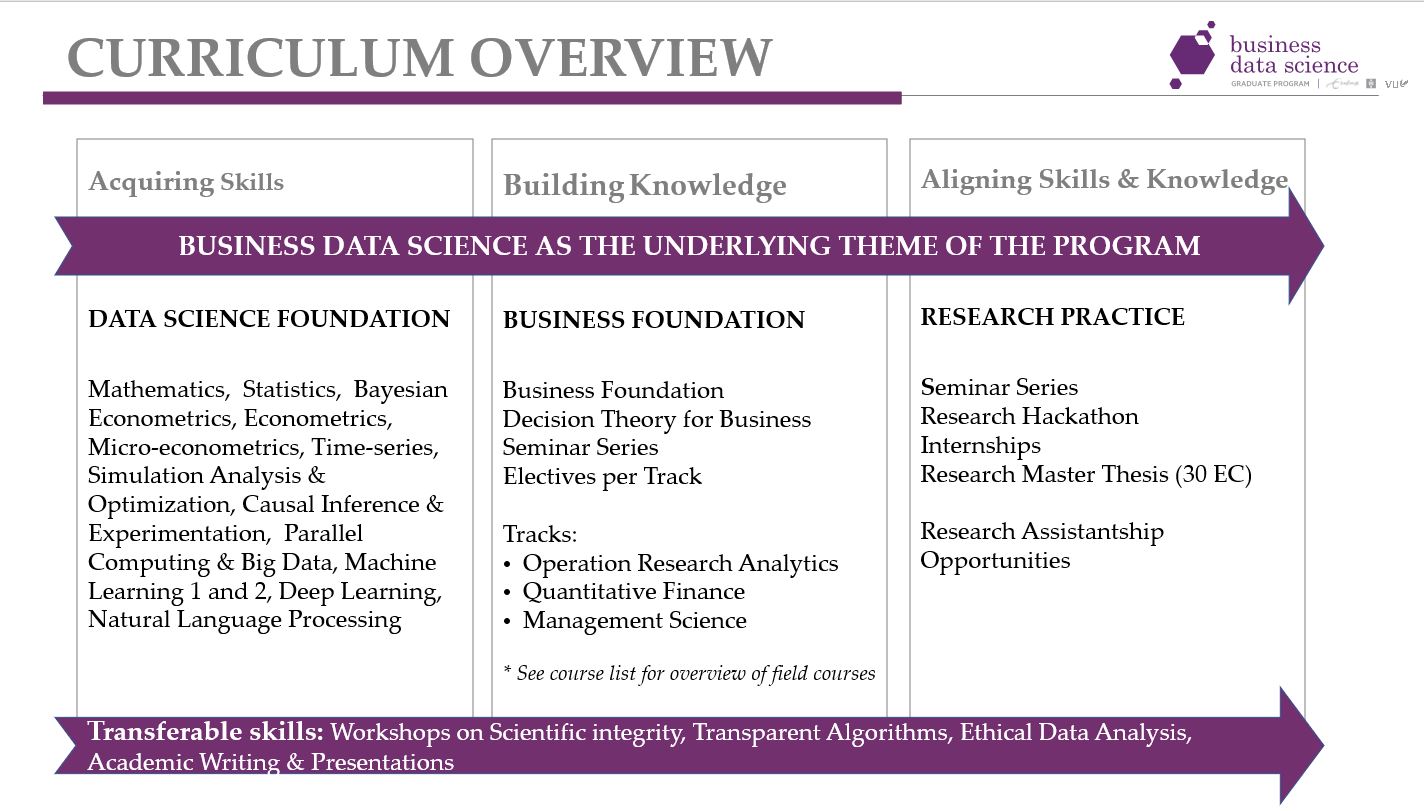Program Outline
Business Data Science offers a Research Master’s Program with three tracks: in Quantitative Finance, Management Science and Operations Analytics
The Research Master Business Data Science at Tinbergen Institute is a two-year program (120 EC) with three tracks: Quantitative Finance, Management Science and Operations Analytics.
The program is tailored for recent Bachelor's degree graduates, or those currently still enrolled in an undergraduate degree program, who are looking to pursue a solid course of training leading to a doctoral degree.
Curriculum
The learning objectives of the program are achieved through a curriculum designed around a Data Science foundation, a Business foundation and Research practice.

Data Science Foundation - Acquiring skills
In the first year, the primary objective is to build a solid data science foundation and expose students to a variety of methodological approaches. These skills are applied to various business disciplines in the field courses.
Business Foundation - Building knowledge
In the second year, students focus on a business discipline, selecting from: 1) management science (entrepreneurship and innovation, marketing science, human resources and organization, knowledge and information networks, management and strategy) 2) operations analytics 3) quantitative finance and accounting. The courses have been carefully selected by a team of experts with the aim of ensuring the perfect learning trajectory that will lead to substantive contributions in each discipline and its subfields.
Research practice - Aligning skills and knowledge
The curriculum starts with an overview of the business problems that data science can address, which also exposes students to fundamental components of multiple fields in business. This early exposure helps students to absorb and process materials presented later in courses on methodology, with respect to the various business perspectives. Students become further acquainted with research topics in business during seminars held throughout the first year and internships, as well as during the research hackathon. The hackathon makes students think about how to approach the problems that arise in the various disciplines and puts their knowledge to the test.
First year students will address problems in all of the different business fields; second year students will focus on addressing the problems linked to their field of specialization. The Research Master thesis represent students’ final moments of integrating business and data science, and will showcase their ability to identify relevant problems and address them using cutting-edge techniques to make a substantive contribution to the field.
Research Master Business Data Science in 16 slides! Get an idea about the program through this information sheet or by viewing the Annual Schedule of the Research Master Business Data Science at Tinbergen Institute.
Academic and Examination Regulations
Academic Calendar 2025-2026
Courses are taught in eight-week blocks. The final week of each block typically serves as the exam week.
| Block 0 | Aug 25 -29 | Introduction and refresher courses |
| Block I | Sept 1 – Oct 17 | Lectures |
| Oct 20 -24 | Exams | |
| Block II | Oct 27 - Dec 12 | Lectures |
| Dec 15 - 19 | Exams | |
| Dec 20 - Jan 4 | Christmas Holidays | |
| Block III | Jan 5 - Feb 20 | Lectures |
| Feb 23 - 27 | Exams | |
| Block IV | Mar 2 - Apr 17 | Lectures |
| Apr 20 - 24 | Exams | |
| Block V | Apr 27 - July 10 | Lectures and Exams |